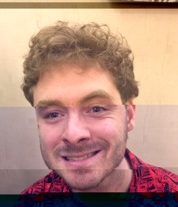By Keith R. Murfee-DeConcini
A few months ago, I was having coffee with a friend from CUNY, telling her about this internship and I mentioned the slogan of YAI, "Seeing Beyond Disability." She took issue with it, commenting that people should not have to see beyond disability; they should just see disability and accept it as a part of the person. Ideally, yes that should happen; however, we do not live in an ideal world. Sometimes people have to see beyond disability first, in order to be able to come back and accept disability.
I remember a few years back, I was having lunch with a very dear friend of mine near Lincoln Center when we saw a couple dressed up, on their way to what we assumed was their prom or some other formal event. What was striking about this couple was the young woman, who was wearing a bright red dress, had a metallic prosthesis for her left leg. She could not have been older than 17 or 18 and yet the confidence in the way in which she walked arm in arm with her date was stunning.
In a conversation with another friend, my disability came up and my friend said, "I can't believe people call you or think of you as disabled! I don't." When I asked her what she considered "being disabled" meant, she said she considered it being human. Her answer has stayed with me ever since because that was the first time someone had said something that bold, that it started to shift my view of having a disability to one of having a shared experience in relating to disability, especially in seeing the hidden disabilities in others around us.
I was finishing up a lunch meeting with my pastor in Tucson, Arizona and as we were walking back to his car, he echoed the same statement of not considering me disabled. Now, it is important to point out that neither of them considers disability as something negative, something that should be feared and avoided. They could see my disability as a part of me, rather than being all of me; which is what most people see when they see a person with a disability. They see only the disability and not the person who happens to have a disability. A disability is a part of a person but it does not make up the person.
I like to meet new people whenever possible and recently a close connection was formed through a social networking site. When the topic of my voice came up, through promoting last week's blog post, I asked the person if she could get used to my voice, especially if our connection progressed. She said, "Your natural accent is a part of what makes you who you are and that's beautiful." Seeing beyond a disability is not hard to do, it allows a person to see another person's full potential while being aware of all the parts that make up that person. Seeing beyond is not ignoring. It is about accepting, even if that acceptance is not right away in some cases. So if you are struggling with the "seeing beyond" concept or know someone who is, as a person who has experienced both stigma and acceptance, I offer this advice: Take a risk and plan to be surprised.
